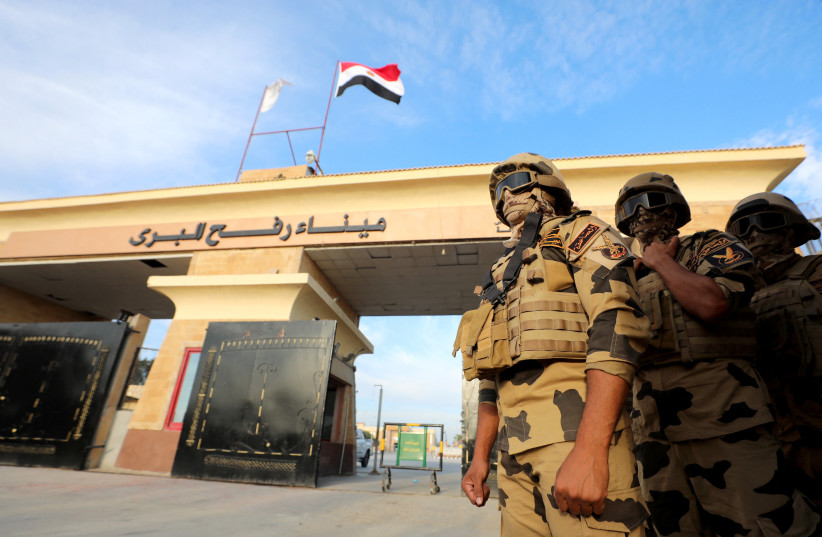Palestinians living in Gaza must not be forcibly relocated to neighboring Egypt as they seek a safe haven from IDF aerial bombing, US President Joe Biden and Jordan's King Abdullah agreed when they spoke by phone on Tuesday night.
They “agreed that it is critical to ensure that Palestinians are not forcibly displaced outside of Gaza,” the White House said after the call.
US National Security Council spokesperson John Kirby echoed that sentiment in a briefing with reporters on Wednesday.
He rejected any reports of a plan to expel Palestinians from Gaza.
“I want to stress that is not our policy. That is not what we are after. We want to make sure that the people of Gaza should they want to go back home, can go back home. But if they want to get out in the interim they should be able to get out.”

Some 1.4 million of the 2.3 million residents of the Gaza Strip have fled their homes in an attempt to escape IDF bombings or explosions from failed Palestine rocket launches.
Hamas has asserted that over 8,600 Palestinians have been killed since the start of the war on October 7.
Israelis have suggested that Palestinian civilians in Gaza should be temporarily allowed to relocate to Egypt for safety until the war ends.
Palestinians have voiced concern that this would be a second expulsion, akin to what happened to them during Israel’s War of Independence in 1948. The some 750,000 Palestinians who fled during that war were never able to return home, an event which Palestinians refer to as the Nakba.
Kirby on Wednesday stressed that “There is no US policy for endorsement for some sort of permeant settlement” of Palestinians outside of Gaza.
The Gaza War was sparked when Hamas infiltrated southern Israel, killing over 1,400 people and taking more than 240 hostage.
Hamas says it will conduct October 7-type attack again
Hamas official Ghazi Hamad told a Lebanese news outlet this week his organization would execute an October 7-type attack again, because it did not believe that Israel should exist and should be removed.
Kirby said, “this is what is at stake for the Israeli people, that is what is at stake for the people of Gaza, that Hamas is wiling to continue this fight and will continue to try and slaughter innocent Israelis. Those are chilling comments and we all ought to take them seriously.”
Hamas, he said, can not remain in power after the war, he added.
US Secretary of State Antony Blinken said on Tuesday that the United States and other countries are looking at "a variety of possible permutations" for the future of the Gaza Strip if Hamas militants are removed from power.
Blinken told a Senate Appropriations Committee hearing the status quo of Palestinian Islamist group Hamas being in charge of the densely populated enclave could not continue, but Israel did not want to run Gaza either.
Between those two positions were "a variety of possible permutations that we're looking at very closely now, as are other countries," Blinken said.
What would make most sense at some point, Blinken said, was an "effective and revitalized Palestinian Authority" to have governance over Gaza, but it was a question whether that can be achieved.
"And if you can't, then there are other temporary arrangements that may involve a number of other countries in the region. It may involve international agencies that would help provide for both security and governance," Blinken said.
Washington has been speaking with Israel, as well as other countries in the region, on how to govern the Palestinian enclave if Israel triumphed on the battlefield, but a clear plan was yet to emerge.
Among the options that are being explored by the United States and Israel was the possibility of a multinational force that may involve US troops, or Gaza be placed under United Nations oversight temporarily, Bloomberg reported on Tuesday.
In response to the report, the White House said sending US troops to Gaza as part of a peacekeeping force is not something being considered or under discussion.
Some of US President Joe Biden's aides are concerned that while Israel may craft an effective plan to inflict lasting damage to Hamas, it has yet to formulate an exit strategy.
"We have had very preliminary talks about what the future of Gaza might look like," State Department spokesperson Matthew Miller said in a briefing. "I expect that it will be the subject of a good bit of diplomatic engagement moving forward," he added.
Reuters contributed to this report
